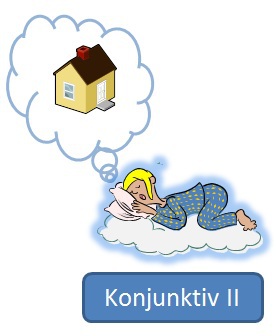
The Subjunctive II (Konjunktiv II) in German
The subjunctive is used to express: Desire, dreams, fantasies or imaginary situations.Use of “Konjunktiv II”
It is used to express:- desire, dreams, fantasies, imaginary situations
Was würden Sie machen, wenn Sie Bundeskanzler von Deutschland wären? What would you do if you were the President of Germany?
- polite form for asking for something
Ich hätte gern eine Cola I’d like a Coca-Cola
- indirect speech for when use of Konjunktiv I is ambiguous

Er meint er würde gut singen He thinks that he sings well
- Recommendations or suggestions
Wenn ich an deiner Stelle wäre, würde ich ein gutes Buch kaufen If I were in your place, I’d buy a good book
- With the German words “fast” or “beinahe” (both mean “almost”). When a situation is described that just barely did not take place.
die Frau wäre fast vom Pferd gefallen die Frau wäre beinahe vom Pferd gefallen The woman almost fell from the horse
Original form of the Subjunctive II (Konjunktiv II)
The original “Konjunktiv II” form is used for auxiliary verbs, for modal verbs and some irregular verbs. The reason is that for regular verbs the “Konjunktiv II” is the same as the “Präteritum”, which is why the construction “würde” + infinitive is used to avoid confusion (this construction is sometimes called “Konjunktiv III”).| sein | haben | werden | |
| ich | wäre | hätte | würde |
| du | wärst wärest | hättest | würdest |
| er/sie/es | wäre | hätte | würde |
| wir | wären | hätten | würden |
| ihr | wärt wäret | hättet | würdet |
| sie | wären | hätten | würden |
Konjunktiv II with modal verbs
| dürfen | können | mögen | müssen | sollen | wollen | |
| ich | dürfte | könnte | möchte | müsste | sollte | wollte |
| du | dürftest | könntest | möchtest | müsstest | solltest | wolltest |
| er/sie/es | dürfte | könnte | möchte | müsste | sollte | wollte |
| wir | dürften | könnten | möchten | müssten | sollten | wollten |
| ihr | dürftet | könntet | möchtet | müsstet | solltet | wolltet |
| sie | dürften | könnten | möchten | müssten | sollten | wollten |
Was möchtest du tun? What would you like to do?
Other verbs that use the original Konjunktiv II form
The original Konjunktiv II form is used with very few verbs. The most important ones are: Important note: The Konjunktiv II expresses the PRESENT.| Verb | Konjunktiv II |
|---|---|
| brauchen (to need) | ich bräuchte |
| bringen (to bring) | ich brächte |
| denken (to think) | ich dächte |
| finden (to find) | ich fände |
| geben (to give) | ich gäbe |
| gehen (to go) | ich ginge |
| kommen (to come) | ich käme |
| tun (to do) | ich täte |
| wissen (to know) | ich wüsste |
Würde + Infinitive
Given that the original form of the Konjunktiv II is the same as the Präteritum for most verbs, the “würde” + infinitive construction is used often, which is called Konjuntiv III by some authors. NOTE 1: Würde + Infinitive expresses the present or future. NOTE 2: It is interesting that the Würde + Infinitive form is Futur I with the auxiliary verb werden conjugated in Konjuntiv IIWenn ich an deiner Stelle wäre, würde ich Deutsch lernen If I were in your place, I would learn German
| Pron. | Conj. würde |
|---|---|
| ich | würde singen |
| du | würdest singen |
| er/sie/es | würde singen |
| wir | würden singen |
| ihr | würdet singen |
| sie | würden singen |
Other Verb Tenses of Konjunktiv II
As we have seen, the Konjunktiv II is problematic in that it is not normally distinguishable from the Präteritumwhich is why the auxiliary verb werden is used to construct an alternative form (Würde + Infinitive). Indeed, the original Konjunktiv II form has another problem: It only expresses the present. The solution to this problem is to once again use an auxiliary verb.Plusquamperfekt Konjunktiv II
Despite the name, this is just used to express the PAST and not the past perfect It is formed simply by conjugating the auxiliary verb ( haben or sein, depending on the verb) in Konjunktiv II PräteritumIch hätte dich geliebt wie keine andere I would have loved you like no other
Futur I Konjunktiv II
It is formed by conjugating werden in Konjunktiv II: würde + infinitive:Ich würde in Zukunft gerne ein Auto haben In the future, I would like to have a car
Futur II Konjunktiv II
Just like Futur I, it is formed by conjugating werden in Konjuntiv II: würde + participle II + ( sein or haben):Ich würde dieses Haus gekauft haben I would have bought this house
]]>